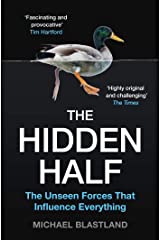Do we kid ourselves about the reality of seeing patterns in our experiences? Are our assumptions about our ability to transfer knowledge from one circumstance to another more tenuous than we believe?
Michael Blastland, author of The Hidden Half: The Unseen Factors that Influence Everything, engages in a discussion with host Russ Roberts in this episode about the reality of how much we don’t know, and the importance of knowing that we don’t know. Overconfidence by experts in development aid initiatives like “new” toilets in India has led to counterproductive outcomes, while other “fixes” have been disastrous. Perhaps you’ll reflect with us about how our own understanding is often imperfect, and why this also keeps life exciting! We would love to hear your thoughts.
1- Have you faced a recent challenge to a personally settled presumption that is based on a worldview? Was it difficult to realize you were wrong? Explain.
2- In his story about the genetics and environment experiment with crayfish in Germany, how does Blastland conclude that a third cause makes up the hidden half? If science misses the recognition of a “vast range of uncertainty because it is unpredictable”, should the book title be changed to the Hidden three-quarters or more?
3- What point does Roberts make regarding the difference in Blastand’s hidden half view of randomness and F.A Hayek’s view about the multitude of variations in behavior in The Pretence of Knowledge?
4- The probability studies of medicine efficacy don’t inform us about how medicines might work or don’t work on an individual. What are other examples of how we are prone to confuse probability outcomes with individual outcomes?
5- Nobel Prize winner Esther Duflo emphasized that the knowledge of contextual details is as important as the grand idea in economic development. How do the stories of aid disruptions further complicate the weakest link theory?



Comments are closed.